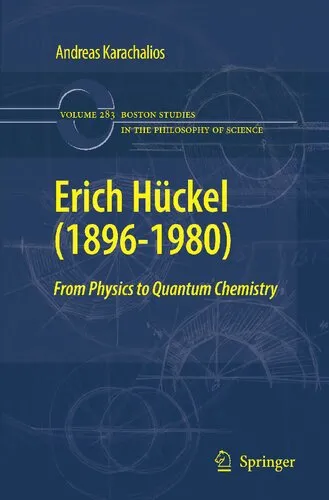Erich Hückel (1896-1980): From Physics to Quantum Chemistry (Boston Studies in the Philosophy and History of Science, 283)
4.5
Reviews from our users

You Can Ask your questions from this book's AI after Login
Each download or ask from book AI costs 2 points. To earn more free points, please visit the Points Guide Page and complete some valuable actions.Introduction to "Erich Hückel (1896-1980): From Physics to Quantum Chemistry"
"Erich Hückel (1896-1980): From Physics to Quantum Chemistry," part of the Boston Studies in the Philosophy and History of Science, delves into the life, contributions, and enduring legacy of Erich Hückel—a scientist whose work bridged the disciplines of physics and quantum chemistry. This book is a captivating journey through the intellectual landscape of the early 20th century, told through the lens of one of its prominent figures. Thoroughly researched and expertly written, it explores Hückel's groundbreaking theories and their impact on shaping modern scientific thought.
Erich Hückel is best known for his pioneering contributions to quantum chemistry, particularly the Hückel method, which addressed π-electron systems in organic molecules. Yet, few recognize the extent of his multidisciplinary influence, which spanned theoretical physics, chemistry, and even mathematics. This book goes beyond a simple biographical account; it situates his scientific achievements within the sociopolitical and academic contexts in which they emerged. By doing so, it provides readers with a richer understanding of how scientific advancements are shaped not only by individuals but also by broader historical forces.
Detailed Summary of the Book
The book is structured to provide both historical and scientific insights into Erich Hückel's life and work. It opens with a biographical sketch of Hückel’s early life, his education, and the formative influences that guided his scientific journey. From his initial studies in physics under the guidance of luminaries like Arnold Sommerfeld to his transition into quantum chemistry, the narrative highlights key moments that shaped his career.
The core of the book focuses on Hückel's most well-known contribution: the Hückel Molecular Orbital (HMO) theory. Developed during the 1930s, this method was revolutionary in its ability to predict the stability and electronic properties of conjugated molecules. The text delves into the technical aspects of the Hückel method, presenting it in a way that is accessible yet rigorous, making it valuable for both seasoned scientists and readers interested in the history of science.
The book also explores Hückel’s lesser-known contributions to physics, such as his work on statistical mechanics, along with his collaborations with other prominent scientists of the time. It discusses the challenges he faced during the Nazi regime in Germany and how these affected his career trajectory.
Ultimately, the book provides a comprehensive picture of Hückel’s intellectual legacy and how his work continues to influence contemporary research in chemistry and beyond.
Key Takeaways
- Erich Hückel was a bridge-builder between physics and chemistry, pioneering the application of quantum mechanics to molecular systems.
- His HMO theory remains a fundamental framework in modern computational chemistry and organic chemistry.
- The book emphasizes the interplay between scientific innovation and historical context, showcasing how external factors like politics and war shaped Hückel's career and contributions.
- Hückel’s story is a testament to the interdisciplinary nature of scientific progress and the resilience required to overcome personal and professional obstacles.
Famous Quotes from the Book
"Erich Hückel exemplified the rare breed of scientist who sees no boundaries between disciplines, pioneering the use of quantum mechanics in fields where tradition once reigned supreme."
"Science does not thrive in isolation; it is shaped and constrained by the society in which it exists. Hückel’s life reminds us of the complex interdependence between scientific progress and historical events."
Why This Book Matters
This book is more than a biography—it is a profound exploration of how science evolves through the contributions of extraordinary individuals and the contexts that shape their ideas. Erich Hückel’s life serves as an inspiring example of interdisciplinarity, resilience, and intellectual courage. For scientists, historians, and philosophy of science enthusiasts, this book offers not only an in-depth look at Hückel but also a reflective examination of the 20th century's transformative scientific landscape.
Moreover, the text underscores the importance of bridging gaps between disciplines—a concept that remains vital in today’s era of scientific specialization. Whether you are a chemist fascinated by molecular structures, a physicist intrigued by the history of quantum mechanics, or simply a curious reader, this book will leave you with a deeper appreciation for the connections between science, history, and society.
Free Direct Download
Get Free Access to Download this and other Thousands of Books (Join Now)
For read this book you need PDF Reader Software like Foxit Reader


